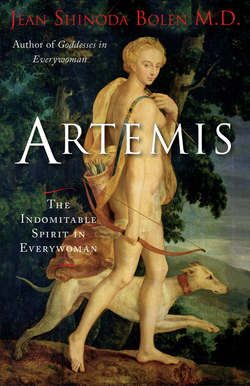Читать книгу Artemis - Jean Shinoda Bolen - Страница 26
На сайте Литреса книга снята с продажи.
Supportive, Protective, Egalitarian Men
ОглавлениеIn one version of Atalanta's myth, hunters who think they are rescuing her kill the mother bear. In another version (preferred by readers who feel a connection with bears and Atalanta), the hunters come upon Atalanta when she is alone in the bear's cave and take her back to their camp. In both versions, Atalanta is, for a time, raised by men, from whom she learns language and proficiency with bow and arrows and spear. She no doubt gets approval and encouragement from these men, taking to everything they teach. Atalanta would have felt special, cared for, and supported during this phase of her life, as do girls in the mold of Artemis who have fathers who are delighted with their spunk and abilities.
It is easy to think of Atalanta as a high-spirited, confident girl who, small as she is, stands toe to toe with these hunters, insisting on what she thinks is true and protesting when something is not fair. Men like these take pride in such daughters. They are “Daddy's best buddy” or “Daddy's little girl.” This kind of relationship often comes to an end as puberty approaches and it's time to establish physical and emotional distance from the budding woman the daughter is becoming. This transition may go smoothly or may be tempestuous and fraught with emotional outbursts. A best-buddy phase with a father who is admired and a good role model supports give-and-take, encourages assertiveness, and recognizes developing skills. These young women tend to become like their fathers or father figures in certain ways that give them a sense of pride, because their fathers are proud of them.
In The Hunger Games (Collins, 2008), Katniss Everdeen is sixteen when the trilogy begins. The happiest time in the week for her is when she goes with her father into the woods, lakes, and meadows outside the District-12 fence, beyond which citizens are forbidden to go. There, he teaches her to hunt with a bow and arrow, to bring down food for the family, and to hunt game to trade. Katniss has both instinct and skill; her arrows fly where she sends them. After her father's death, Katniss becomes the sole provider for her mother and sister. Her mother withdraws into her grief and stops functioning, and it is up to Katniss to look after the family.
Both Atalanta and Katniss excel as hunters, taught by their fathers or father figures to be competent and survive on their own. Katniss clearly identifies with her father and takes over as provider and protector as much as she can at his death. Her mother is clearly not a role model. In fact, both Atalanta's and Katniss' mothers are ineffectual. And, although Atalanta's father rejects her and orders her exposed on a mountaintop to die, in psychological terms, both are “fathers' daughters.” They are women who are decisive, can act swiftly, choose targets or goals of their own, and have the focus and skill to hit what they aim for. Their worlds are outside the household that is the realm of “mothers' daughters.”
In the United States toward the end of the 1960s and 1970s, consciousness-raising groups became the foundation of the Women's Movement. Here, women learned about sexism and inequality. They became determined that this had to change, and they encouraged each other to make a difference. Women shared information, wrote, marched, testified, had demonstrations, and entered formerly all-male enclaves and professions. Ms. magazine began publication. Couples worked to create egalitarian relationships and families. As a result, girls with Artemis qualities circa 1970 and after were likely to have parental approval to be active and confident. Spirited three-year-old girls with minds of their own could express what they wanted and felt, and still bask in the approval of their fathers and mothers. No more Little Miss Muffetts sitting on tuffets eating her curds and whey. Now, far from being frightened away by the spider, these emanicipated girls could be free to investigate and explore all the critters and creatures in the outdoors with interest. Indeed, little Ms. Muffett was “free to be you and me,” and sang the songs to prove it!
